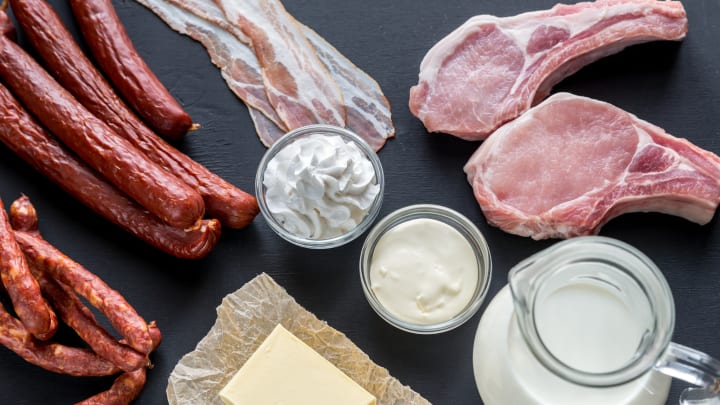Which fats are good for you? Here's one you should eat more of because it's essential.
Dietary Essentials: The Key Fat You Should Consume More of for Optimal Health

The low-fat movement, which began in the 1980s, told us we should eliminate fat, while high-fat diets like the keto diet teach us the reverse. Fat has had quite a debate in dietary discussion forums.
How can you be sure that the answers are there? In actuality, Americans consume a lot of fat in their diets. It's in the cooking oil we use, the fish we cook, and the veggies we consume (avocado, for example). It is needed for energy, cell function, hormone production, and nutrition absorption and is a necessary component of a healthy diet.
Transform your life with the Keto diet today! Start your journey to a healthier you now.
Which fats are the healthiest?

Despite the fact that not all fats are created equal, registered dietitian Chris Mohr argues that overall, fat is necessary for our diet. According to Mohr, the "healthiest" fat is omega-3s, which we require but frequently don't get enough of.
Our bodies cannot produce omega-3 polyunsaturated fats on their own, making them vital nutrients. However, research based on the National Health and Nutrition Examination Survey found that nearly 95% of kids and 68% of adults consume less than the advised quantity.
Fish contains the most omega-3s, but you can also get them from flaxseeds, hempseeds, walnuts, and dark leafy greens. Another sort of polyunsaturated fat called omega-6s is also necessary, but according to Mohr, we don't have any trouble getting enough of it in our diets because it's present in many cooking oils, nut butters, and eggs.
You should aim to obtain a variety of fat sources, according to Mohr. The Dietary Guidelines for Americans state that fat should make up between 20 and 35 percent of our daily caloric intake, with saturated fats making up no more than 10 percent of that total. The recommendations advise staying away from trans fats, as they have been linked to a higher risk of type 2 diabetes, heart disease, and stroke.
According to Mohr, some types of fat may not be good for us in excess, while others are excellent. There are several nuances when it comes to the type and amount of fat we consume.
Trans fats, saturated fats, and two types of unsaturated fats are the four main types of fats:
Trans fat: The risk of heart disease, stroke, and type 2 diabetes is known to increase, and it is typically present in the form of partially hydrogenated oil.
Saturated fat: The majority of the time, it is present in solid forms like meat, butter, and coconut oil.
Monounsaturated fat: a better choice in terms of heart health because it raises "good" cholesterol levels.
Polyunsaturated fat: contains both omega-6 and omega-3 fatty acids, both of which are healthy.
Transform your life with the Keto diet today! Start your journey to a healthier you now.
What advantages does omega-3 have?

In addition to promoting heart health, omega-3 fatty acids may also help reduce the risk of cancer, cognitive decline, and eye impairment. According to Mohr, a deficiency in omega-3s might manifest as dry skin and brittle hair. Omega-3s have anti-inflammatory qualities that may lessen depression, according to studies that have linked them to mood.
For adults following a 2,000-calorie diet, the Dietary Guidelines for Americans suggest eating at least 8 ounces of seafood per week. To promote the baby's growth, it is advised that women who are pregnant or nursing consume 8 to 12 ounces of low-mercury fish per week. Fish weigh roughly 4 ounces per serving.
Fish is the most typical source of omega-3s; traditional favorites like salmon and tuna, but Mohr also suggests trying herring, sardines, and anchovies. Leafy vegetables, vegetable oils, almonds, flax seeds, and flaxseed oil are other sources of it.
Mohr advises folks who don't eat enough fish to look into omega-3 supplements that contain at least 500 milligrams of fatty acid. Check out an algal oil supplement if you don't like fish, because that's where even fish get their omega-3s from.
Saturated fat: Is it bad?

Many people in the public are aware that saturated fat raises low-density lipoprotein cholesterol (often known as "bad cholesterol") and the risk of heart disease. Recent research, however, casts doubt on accepted wisdom and contends that the relationship between saturated fat and an elevated risk of cardiovascular disease is weaker than previously believed.
Saturated fat, in Mohr's words, is "one piece of the puzzle" when it comes to the risk of cardiovascular disease. When consumers are instructed to eat less saturated fat, they frequently increase their intake of refined carbs like added sugars, according to Mohr. According to Mohr, this may cut LDL, but it will also lower HDL (the "good" cholesterol) and elevate triglycerides. Swapping saturated fat with unsaturated fat may be healthier.
The key message, according to him, is to replace saturated fat with unsaturated fats wherever possible and concentrate the majority of your fat diet on monounsaturated and polyunsaturated fats.
Fats are essential, but we must watch what and how much we eat, according to Mohr.
Transform your life with the Keto diet today! Start your journey to a healthier you now.






Comments
There are no comments for this story
Be the first to respond and start the conversation.